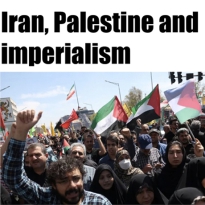Columns
You are here
Why do we need revolutionary organization?

May 22, 2013
Capitalism produces exploitation, oppression, environmental destruction and war. How can we connect resistance to these specific expressions in the here and now to challenging the system that produces them?
Marx argued that revolution was necessary to overthrow capitalism, both because capitalists themselves would never voluntarily hand over their wealth and power, and because through the process of revolution ordinary people make themselves anew, and shed the backward ideas (what Marx referred to as the “muck of ages”), that divide us from each other. The need for a revolutionary organization flows from this understanding.
Reform or revolution
Reformist parties—such as the NDP in Canada, or the Labour Party in Britain—argue that it’s possible to gradually reform capitalism and turn it into a more humane system, and maybe even eventually, into a socialist society. Even a cursory look at history shows that this is a utopian dream that has been repeatedly dashed on the hard rocks of capitalism and corporate control.
Innumerable social democratic governments around the world have discovered that being elected to parliament does not mean being elected to power. Power, under capitalism, remains securely in the corporate boardrooms—where the real decisions that affect all our lives are made.
Parliament has no power to abolish exploitation, oppression or imperialism and most reformist governments end up adapting to capitalism—like Britain’s Labour party joining the Iraq War, Greece’s PASOK government imposing brutal austerity, or South Africa’s ANC presiding over the Marikana massacre. We can see how the federal NDP leadership is accommodating to capitalism to appease Bay Street in the lead up to the 2015 election: denying Quebec’s right to self-determination, ignoring Idle No More, supporting war in Mali and promising to develop the tar sands. Governments who try to reform capitalism from above face capitalist coups—like in Iran 1953, Chile 1973, and the coup attempt in Venezuela in 2002.
Struggle from below
Every great reform—from winning the vote and civil rights, defeating the abortion law, stopping Canada from joining the Iraq War, stopping the tuition hike in Quebec, preventing the 2002 coup in Venezuela—was won from below, through mass struggle that can be a training ground for revolutionary theory and practice. In Egypt a decade of struggles for reforms paved the way for the revolutionary process that began in 2011.
As the German revolutionary Rosa Luxemburg wrote in Reform or Revolution: “Can we counter-pose the social revolution, the transformation of the existing order, our final goal, to social reforms? Certainly not. The daily struggle for reforms, for the amelioration of the condition of the workers within the framework of the existing social order, and for democratic institutions, offers an indissoluble tie. The struggle for reforms is its means; the social revolution, its aim.”
In this daily struggle, no movement is homogeneous. There is always an ongoing debate about which way forward, informed by different ideas and different politics that can lead to different outcomes. There are always pressures for movements to break the indissoluble tie between reform and revolution—either renouncing revolution with isolated reforms delivered by small numbers in Parliament, or renouncing reforms with abstract slogans by small numbers in the streets. Neither of these approaches challenges the 1% or allows the 99% to change their ideas through self-activity.
Revolutionary organization
The solution is for those who are already revolutionaries to join together in an organization—not so they can make change themselves but so they can better build and unite movements in which they are rooted, to fight for every possible reform and through the process to win people to revolution. Revolutionary organization is not counter-posed to self-emancipation, but complementary—learning, generalizing and intervening to build the movements.
Leon Trotsky, one of the leaders of the 1917 Bolshevik Revolution in Russia, came to this understanding late in the revolutionary process, but it was an extremely valuable lesson: “Lenin’s position came through to me with full force. What had seemed to me to be ‘splitterism’, ‘disruption’, etc., now appeared as a salutary and incomparably farsighted struggle for the revolutionary independence of the proletarian party.”
The existence of a mass revolutionary organization was critical to the Russian Revolution of 1917, and this method of organizing began to spread around the world. But other revolutionary organizations were begun too late and were too small to spread the revolution; the Russian Revolution was isolated and crushed, and the state capitalist regime under Stalin created a caricature of a revolutionary organization in its own image—as a force that stands above the people, and tells the masses what to do.
But nothing could be further from the truth. The Bolsheviks, and Lenin himself, strove to create a party of the working class, where all members would be leaders in their workplaces, in their communities, in their barracks. It was a party that, even from its very beginnings as a grouping of modest study circles, listened to and learned from the class. As the party expanded and drew in more workers it became rooted in the struggles taking place in Russia—against the autocratic landlords and bosses, against oppression, and against war.
The aim of revolutionary organization is to bring together all those who want to fight on every front—against exploitation, oppression, environmental destruction and war—both in the here and now and in the future, so that we can be more effective. This involves learning from the history of workers’ struggles internationally, learning from current-day struggles and forging unity in action. If you agree with these ideas, join the International Socialists.
If you like this article, register now for Marxism 2013: Revolution In Our Time, a weekend-long conference of ideas to change the world. Sessions include "Why is capitalism in crisis", "From Orange Wave to Third Way: The NDP under Mulcair", and "When revolution swept the world", and "Why we need revolutionary organization."
Section:










